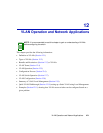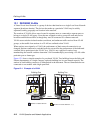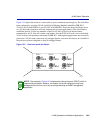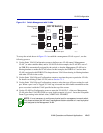
VLAN Operation
VLAN Operation and Network Applications 12-7
12.5 VLAN OPERATION
The following sections describe the operation of a VLAN switch and discusses the operations that
a VLAN switch performs in response to both normal and VLAN-originated network traffic.
12.5.1 Description
The 802.1Q VLAN operation is slightly different than the operation of traditional switched
networking systems. These differences are due to the importance of keeping track of each frame
and its VLAN association as it passes from switch to switch or from port to port within a switch.
12.5.2 VLAN Components
Before describing the operation of an 802.1Q VLAN, it is important to understand the basic
elements that are combined to make up an 802.1Q VLAN.
Stations
A station is any end unit that belongs to a network. In the vast majority of cases, stations are the
computers through which the users access the network.
Switches
In order to configure a group of stations into a VLAN, the stations must be connected to
VLAN-aware switches. It is the job of the switch to classify received frames into VLAN
memberships and transmit frames, according to VLAN membership, with or without a VLAN Tag
Header.
12.6 CONFIGURATION PROCESS
Before a VLAN can operate, steps must be performed to configure the switch to establish and
configure a VLAN. Enterasys Networks VLAN-aware SmartSwitches default to operate in the
802.1Q VLAN mode. However, further configuration is necessary to establish multiple logical
networks.
NOTE: The actual steps involved in VLAN configuration using Local Management are
presented in Section 12.8. This brief section describes the actions that must be taken in
very general terms, and is intended only to aid in the Administrator’s understanding of
VLAN switch operation.


















